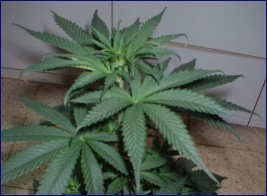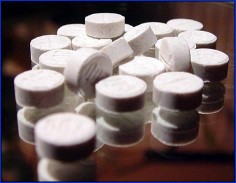

|
Drug Law Policy |
Index |
Sections |
Related Links |
|
Summary |
   |
Summary
The UK population are a nation of Drug users. Tea, coffee, alcohol, smoking,
ectasy, the list of substances used by the populace is indeed long. Even though
we are now in the 21'st century, UK Drug laws are still not only ineffective, but
un-workable. A great percentage of the UK population have tried all sorts of
drugs at some time in their lives, and many continue to do so without their
lives falling apart - contrary to the popular stereotype of a drug user who is
unable to
live an ordinary and productive life.
A large percentage of tobacco smokers also use Cannabis in the UK. Cannabis is
of course still illegal, but are we to seriously leave in place a law which
criminalises millions of people ? Do we really want to be in the situation where
millions of UK people use cannabis every week, but where technically you could
still get arrested for possession ? Hundreds of millions of pounds is spent each
year on Policing drugs, which is an inherently unachievable target.
The UK people deserve to have the right to freedom to choose what they do with
their bodies. No government should have the right to criminalise another person
because they wish to use any given substance. Prohibition of any drug - whether
currently legal, or otherwise, is pointless.
|
A Special Note on this Section |
|
|
First things first.......I shall do what I consider the obvious, yet most people
fail to consider...
Q.) What is a drug ?
A.) A drug is a chemical substance which, amongst a number of things, can affect
the human nervous system.
Without compiling a biology '101 course about the basics of the human nervous system (NS), let us note that the core part of the human nervous system is the brain. It is the effects that drugs have on the brain which is of concern, the brain is entirely responsible for how we feel and behave throughout our lives.
So, at this initial stage we can say that any
substance that affects the human nervous system is a 'drug', which will usually
have an effect on the human brain.
Drug Classification
What substances/products are therefore to be classified as drugs ? (this
part of my article is where some of you are going to start wildly jumping up and
down out of your desk chairs).

Legal Drugs: Stimulants - Tea
Typical Drugs :
-Standard household Teas, Coffees,
and all other Caffeine based drinks ('Red Bull' being an extreme case of a
concentrated stimulant drink)
-Chocolate - all cocoa based products, which are known to have a strongly
addictive and mind affecting response on many people.
-Alcohol : Any 'booze' is by definition a drug. People enjoy having a drink, and some end up chronically addicted.
-Smoking : Primarily, Tobacco
which contains Nicotine, but also of importance is Cannabis.
-Speed, Ectasy, Amphetamines, LSD : usually termed 'recreational drugs', used
primarily in
the Club/Party scene.
-Cocaine, Heroin, Crack :
considered the 'hardcore' class of drugs by most people, yet are widely used across all
social classes.
Key Proposals
1. Decriminalisation of ALL drugs. Yes, I said 'ALL'.
2. A nationwide Government campaign to see all those who require help, to receive it.
EVERY single person who requests help to get off drugs should receive it. Such a
policy would have enormous social benefits in the long term, helping
considerable numbers (100,000- a few million) to quit what ever addiction they
wish to stop.
Primary help
a.) Drug users, would be encouraged to 'register' with a local GP or specialist
drug clinic. Registration would then entitle the user to free supply of the
drug/s they are addicted to.
*Until the late 1960's there was a scheme in the UK, whereby people could
register as drug addicts, and would receive supplies of the substances they were addicted to. So, what I am suggesting is not actually totally off the wall,
and there is a fair bit of historical evidence to support the reintroduction of such a
scheme.
b.) All registered users would be offered the opportunity for professional drug rehabilitation, and this would concentrate on psychological help.
Cost of the Proposal
There are 2 core components. First, the cost of supplying and getting hold of
supplies of cocaine and other drugs. However, these drugs are in fact cheap to
manufacture, and so this cost is negligible. The cost of running the
registration and rehab' scheme on a nationwide level is probably going to cost
£250-750 million a year, depending on how many decide to register with the
scheme.
However, I believe that getting addicts registered, seeing that they no
longer will be committing crime to feed their tragic addictions, will save the
nation many billions each year. Crimes such as street robbery will collapse by as
much as 75-90% if the majority of chronic drug addicts enter the scheme and
progress to coming off drugs entirely.
Let us note that in the prisons of this country, there are thousands of inmates who
are simply there because they are so chronically addicted to various drugs, they commit crimes on a
daily basis simply to feed their tragic habit. Simply locking these people up is pointless in the long term, as it
fails to address the underlying reason for their crimes. As many realise also,
it is easier to get hold of drugs whilst in prison, than in the outside world -
which further necessitates some major change in policy.
Justification behind this Proposal
Current Policing and regulations are inherently futile. The UK Government
themselves admit that only a very small percentage of illegal drugs are
confiscated and destroyed, despite endless anti-drug initiatives to 'eradicate drugs from the
nation'.
FACT 1 : It is impossible to stop the use of drugs in ANY nation. Not one
nation has ever succeeded in reducing drug use, no matter how harsh the laws and
policing.
Once we accept this initial fact, we can start to consider other possibilities.
If however, some of you at this point are still freaking out, then there is very
little point in reading any further.
FACT 2 : If you ban something, the
demand tends to be higher than it would be if it was legalised.
It is a classic trait of humanity that people want the things that are banned.
There is an alluring character to something that is deemed as outside the law,
and for some people (certainly not all), the very fact that it is illegal, makes
it more attractive to get hold of. I cite the case of Holland, where Cannabis is
now essentially semi-legal, and where Cannabis usage is actually LESS than the UK
where cannabis is still entirely illegal.

Cannabis : Illegal in the UK, but used by Millions each week.
Implications of the proposal
The implications of what I have suggested are enormous. There are probably tens
of thousands of people who are addicted to cocaine and heroin across the UK.
Regarding recreational drugs, especially ectasy. I find it stunning to see the
attention that the media place on Ectasy, compared to the already legal drugs
such as alcohol. Ectasy was officially attributed to not more than 55 deaths in
2002. Compare this to as many 50,000 drink related deaths each year. Does it
make sense for anyone who despises 'drugs' to focus all their attention on what
is a relatively benign substance (Ectasy), rather than dealing with one of the
most destructive drugs ever created - alcohol ? As a social scientist, I am
amazed at the situation mainstream society currently accepts, all the most destructive
drugs are legal, and the relatively benign ones are banned.
Crime : In countless articles I
have read across the years, it has been noted that over 90% of ALL crime is drug
related. Drug addicts are going to get their fix no matter what they are
required to do. Whether it be a street robbery, shop theft, house burglary, a
drug addict will do anything necessary in order to get hold of the money to
finance their habit.
The facts are clear, most crime is a result of drug addicts funding their habit.
If a majority of serious drug addicts were registered and helped onto official schemes, crime
levels would
collapse - something that no home office minister has ever aimed for.
Relative dangers
Just how many people die from using 'Drugs' each year ? Do more people die from
Cocaine than Drinking ? Consider for a moment those questions for a moment
before you read on.
---
Smoking : According to the UK Dept. of Health, smoking results in around 120,000
deaths each year. In 2002/03, 27% of men and 25% of women were smokers, which is
a massive drop since the early 1970's, when rates were almost at 50% of the
population.
Alcohol : The exact figures for death from alcohol are somewhat hard to
determine. However, the absolute minimum estimate each year is 5000, with the
average upper estimate (including related deaths) at around 45,000. The
institute for Alcohol studies estimate there were 15-22,000 alcohol related
deaths in the year 2000 (see
Alcohol and Mental Health fact sheet, IAS' 2000)
Now, what about the 'drugs' that
most people are worried about ?
In the latest figures (2002), some 2685 died from some form of 'drug' poisoning.
Now many of these died from taking aspirin, paracetomol etc. The baseline figure
is that in 2002, Deaths as a result of drug 'misuse' were 58% of the overall
total. So, it can be said that there were around 1557 deaths as a result of
people using illegal drugs in 2002. Is 1557 deaths more or less than you would
have guessed ?

Ectasy : Less destructive for UK society than Alcohol
Total deaths in 2002, as a result
of 'drug misuse' : 1557
Ectasy : 55
Cocaine : 139
Heroin : 790
see:
Office for National Statistics for details
How do you feel when you compare the legal drug death figures to the illegal
drug death totals, are you surprised at the data ? Do you still believe that
Alcohol is 'safe' and should remain legal - even though it kills perhaps as many
as 50,000 people in the UK each year ? These are hard ethical questions for each
of us, but must be addressed if society is to progress this century.
UK Drug Laws are flawed, both in
definition, and in their effectiveness. Despite billions of pounds of
expenditure in policing and all related enforcement procedures, drugs of all
types remain in circulation within the UK.
The debate of the legalisation of drugs is very much a philosophical one, in
addition to one of ethics. For some people to claim that Alcohol and Tobacco are
not drugs is clearly wrong. It is also clear that many people still ignore the
fact that drinking and conventional smoking accounts for 98% of all drug related
deaths in the UK - more than 160,000 every year.
The question is this. The UK has tried to ban certain substances, yet it has
utterly failed for over fifty years. Are we to continue to follow this failed
strategy, despite knowing that any attempt to restrict certain drugs is futile ?
A final thought, as individuals do we not have the right to choose in this
nation ? Do we own our own bodies, or does the state own us ?
Links
Cannabis Timeline
: A fascinating historical summary on Cannabis across the ages - makes for
seriously interesting reading in terms of law.
BBC Science : Cannabis : Special section dealing with all matters/news related to the UK's favourite illicit drug.
New Scientist :
Cannabis 'hot topic' section : UK's leading popular science magazine with some
great articles.
Campaign Groups...
UK Cannabis internet activities :
Campaigning for the legalisation of Cannabis, esp. for medicinal purposes.
Legalise Cannabis Alliance : UK based site,
directed to bringing together people to form an campaign to see Cannabis
legalised.
Cannabis Campaigners : UK group
dedicated to proposing the legalisation of cannabis, particularly in regards to
alleviated suffering.
Cannabis culture : Worldwide news on Marijuana use, an interesting site which is useful as an guide on govt. law changes
Christians for Cannabis : Very weird site, run a group of happy Christians who support the right to use cannabis.
UK
Cannabis Cultivation : Site dedicated to offering advice/information on
Cultivation
Other related links...
Drugs Information : Useful reference
site on Legal matters relating to all drugs, inc. Cannabis.
Portman Group : UK organisation
that promotes 'responsible drinking'.
Institute for Alcohol Studies : A superb
site dedicated to the research of Alcohol and its effect on society
Alcohol concern : Group
dedicated to reducing alcohol miss-use.
Return to
Political Home
Page last updated :
23/07/2004